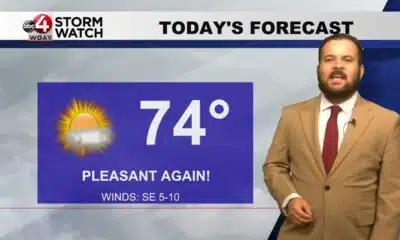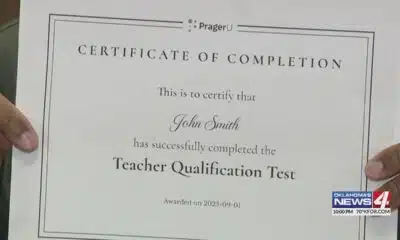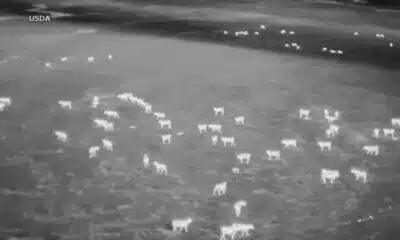News from the South - Kentucky News Feed
Kentucky community colleges working to meet students’ ‘severe’ need for mental health support
by Sarah Ladd, Kentucky Lantern
August 11, 2025
About two-thirds of Kentucky community college students surveyed last year say they have experienced depression or anxiety while 1 in 5 reported engaging in “self-injurious behavior.”
In response, the Kentucky Community and Technical College System is launching a Mental Health Strategy for its roughly 100,000 students.
KCTCS President Ryan Quarles told the Lantern that since taking on his role in 2023, he’s sought to prioritize mental health.
“We know that …. half of all community college students across the country struggle with mental health issues, and the report that we see here clearly shows that Kentucky is higher than national averages,” he said. “So, we still have to learn from other states, but the need is very severe right now.”
The largest provider of postsecondary education in the state, KCTCS will educate employees and students about mental health, create a centralized document full of mental health resources for the whole system, develop a peer wellness program in which students can volunteer as mental health ambassadors for those around them, provide staff with trainings on how to spot depression and anxiety in their students and more.
This comes in response to a 2024 Healthy Minds Study that showed that in the KCTCS system, 68% of surveyed students had depression and 66% had anxiety. That survey also showed 13% of students who took the survey were at risk of an eating disorder and 20% had already engaged in “self-injurious behavior.”
“We know that our students are facing (a) heightened degree of mental health issues that, probably, previous generations have not faced or is undiagnosed,” Quarles said.
Stressors facing students are numerous, he said: financial and housing concerns, food insecurity, upheaval following back-to-back floods in Eastern Kentucky, decimation by tornadoes in West and Western Kentucky and more.
Mental health challenges already existed prior to the global pandemic that hit Kentucky in 2020, but “COVID peeled the onion peel off to show how big of an issue this is,” Quarles said.
In 2022 the World Health Organization pointed to “unprecedented stress” during COVID-induced isolation as a key stressor driving worsening mental health. Children who switched to remote schooling also missed social milestones during that time.
KCTCS plans to apply for grant funding to support the mental health efforts, but for now it comes out of the general budget. It’s too soon to say if the system will ask the General Assembly for project-specific funding in 2026, Quarles said.
“I do think that our legislators are aware of the mental health issues of our students,” he said, “and I think it’s come to them both from their constituents … but also higher ed in general is talking more about this, deservedly so, across the state.”
Christopher Hetherington, executive director of strategic enrollment management at KCTCS, said more and more college students have faced mental health issues over the last two decades, and research is finally revealing the extent of the problem.
“You’ve got the social media, you’ve got the constant, 24-hour news cycle,” he said. “You’ve got financial concerns, currently, within higher education.”
Students also face concerns over where to get enough food — and a large percentage wouldn’t be able to easily get $500 in an emergency, Hetherington said.
“Now that we have more resources, as far as data is concerned, we have a more clear calling to do this work than maybe would have been 10, 15, 20 years ago,” he said.
The Healthy Minds Study
The Healthy Minds Study, which involved 2,500 students between Feb. 26 to March 18, 2024, presented KCTCS with a call to action: better address students’ mental health needs.
The study showed, among other things:
- 86% of respondents described their financial situation as stressful.
- 40% reported having moderate to severe depression with another 27% at mild.
- 38% reported having moderate to severe anxiety, with another 29% at mild.
- 29% of respondents felt isolated from others often, and another 36% felt that way some of the time.
- 72% reported that in the four weeks before being surveyed, they experienced some level of academic impairment caused by their emotional or mental difficulties.
- Among students screening positive for anxiety or depression, 27% received therapy.
- 23% of respondents reported that in the 12 months prior to being surveyed, they were worried about not having stable housing.
- 15% of respondents reported worrying about losing their steady place to live in the future and 2% reported not having a steady place to live at all.
- 45% of respondents were worried about not having enough food in the past year.
Quarles said this data demonstrates “a serious issue” in Kentucky.
“I think that we always knew that mental health was an issue in America, but I think that during and post COVID, it only revealed how big of a crisis it is,” he said. “And it’s not just unique to higher ed. It’s in K-12. It’s in workplace environments. It’s in adult populations. We know that this is a national crisis right now.”
Investments in mental health, Quarles said, should be viewed on the same level as any other type of student support. Prioritizing that, he said, will help students succeed in the long run.
“A healthier society is going to create a healthier economy as well, meaning that students will be better prepared to finish their degree, finish their certificate and be more prepared to enter the job market and be able to fulfill the expectations that an employer may have,” he said. “And that, ultimately, increases the economic prosperity of the state as well.”
‘Nursing school is really hard:’ the pressures of being a student
Charlotte Boyd, who attended Jefferson Community and Technical College from 2019 to 2022 before transferring to Spalding University, believes such a mental health initiative would have helped her.
Boyd, who studied nursing, suffered panic attacks, found virtual learning during the worst of the COVID-19 pandemic to be “frustrating” and didn’t feel properly supported during an intensely stressful time of her life.
“Nursing school is really hard,” she said. “I’m not an anxious person in general, but I had to have a pretty full cardiac workup when I was at JCTC in the nursing program to make sure I wasn’t having cardiac issues. And I wasn’t. I was having … panic attacks. It was really, really horrible.”
Boyd is now working as a labor and delivery nurse at Norton Healthcare in Louisville.
Wendy Johnson, who attended Southcentral Kentucky Community and Technical College from 2006–2009 for respiratory therapy, faced mild stressors during her time as a student. She was the first person in her family to go to college and was often the oldest person in her classes, having started at age 31. That was “a little bit stressful,” she said. She also had two children, 11 and 7 years old.
Johnson, who lives in Scottsville and now works across the border in Tennessee, looked at school differently than some of her peers. She was a dental assistant and originally wanted to study dental hygiene.
“‘You’re going to give yourself a raise right here, and you’re going to have a good career,’” she told herself. Because she started school with children, studying was difficult at times.
“I would have to stay up late or … try to do things before the kids got home from school,” she recalled.
Still, she managed to earn a 4.0 grade point average and received an excellence award.
“At 18 years old,’ she said, “I don’t feel like I would have done as well.”
‘Get it right.’
KCTCS plans to do more surveys of students and monitor what works to improve mental health, Hetherington said.
In community college, there’s also a smaller window to help than at four-year universities, he said. “Our students are gone in a year or two.”
Each of the system’s 16 colleges will also have freedom to customize its mental health approach since each campus population will have different needs.
“We’re very aware that … there tends to be more reluctance in rural areas for people to talk about mental health,” Quarles said. “We also know that perhaps in the more urban areas, there may be more resources or organizations addressing mental health as well. And so there’s going to be some nuances across the state, and this is also an opportunity for us to learn from each other.”
At the spring graduation ceremonies, KCTCS colleges awarded around 10,546 associate degrees, 1,716 diplomas and 31,062 certificates.
“We’re the entry point for the vast majority of Kentuckians starting college, and so it’s very important for us to address mental health needs of our students, because for a lot of our students, if they don’t have a good experience with us, they may never make it to that four-year university, or may never get that skill or trade to get a job,” Quarles said. “So it’s important for us to get it right.”
GET THE MORNING HEADLINES.
Kentucky Lantern is part of States Newsroom, a nonprofit news network supported by grants and a coalition of donors as a 501c(3) public charity. Kentucky Lantern maintains editorial independence. Contact Editor Jamie Lucke for questions: info@kentuckylantern.com.
The post Kentucky community colleges working to meet students’ ‘severe’ need for mental health support appeared first on kentuckylantern.com
Note: The following A.I. based commentary is not part of the original article, reproduced above, but is offered in the hopes that it will promote greater media literacy and critical thinking, by making any potential bias more visible to the reader –Staff Editor.
Political Bias Rating: Centrist
This content maintains a neutral and factual tone focused on the issue of mental health challenges facing Kentucky community college students. It highlights efforts by the Kentucky Community and Technical College System to address these concerns without promoting a partisan agenda. The article provides data, quotes from education officials, and personal student experiences, emphasizing pragmatic solutions and support rather than ideological viewpoints. Overall, the piece is informative and balanced, avoiding political bias to simply report on a public health and education topic.
News from the South - Kentucky News Feed
WKU VB: WKU Falls to Drake in Five Sets
SUMMARY: WKU Volleyball lost a close 3-2 match against Drake after pushing them to five sets. Freshman Kaira Knox led offensively with 21 kills and was named WKU Invitational MVP, while junior Gabby Weihe dominated defensively with a career-high eight blocks in the match. The Hilltoppers excelled in sets one and three but fell short in sets two, four, and the decisive fifth. Defensive specialist Tayler Baron added 16 digs and earned all-tournament honors alongside Knox. WKU improves to 2-1 overall and will next compete at Marquette, facing Marquette, #24 Dayton, and Buffalo on the road.
The post WKU VB: WKU Falls to Drake in Five Sets appeared first on www.wnky.com
News from the South - Kentucky News Feed
McIvor named CUSA Offensive Player of the Week for second straight week
SUMMARY: WKU quarterback Maverick McIvor was named Conference USA Offensive Player of the Week for the second consecutive time in 2025. In a 55-6 win over North Alabama, McIvor threw for 305 yards and five touchdowns in just two and a half quarters, marking the best half by a CUSA QB since 2022. Through two games, he has 706 passing yards, eight touchdowns, and one rushing score. WKU leads CUSA and ranks nationally in multiple offensive categories. The Hilltoppers, undefeated with 96 points scored, will play their first road game at Toledo Saturday, streamed on ESPN+.
Read the full article
The post McIvor named CUSA Offensive Player of the Week for second straight week appeared first on www.wnky.com
News from the South - Kentucky News Feed
LMPD: 2 dead after 4 vehicle collision on Dixie Highway
SUMMARY: A deadly four-vehicle collision on Dixie Highway near Valley Station in Louisville resulted in two fatalities. The crash occurred Sunday morning when a southbound car changed lanes, hitting another vehicle, then crossed into oncoming traffic, striking a third car before crashing into a utility pole. The first vehicle’s driver died at the scene; the third vehicle’s driver died later at the hospital. The other two drivers were unharmed. The crash shut down both directions of Dixie Highway for hours. Neighbors described the area as dangerous and hope the tragedy prompts safety improvements, such as adding stoplights, to prevent future accidents.
LMPD: 2 dead after 4 vehicle collision on Dixie Highway
Subscribe to WLKY on YouTube now for more: http://bit.ly/1e5KyMO
Get more Louisville news: http://www.wlky.com
Like us: http://www.facebook.com/wlkynews
Follow us: http://twitter.com/WLKY
Instagram: https://www.instagram.com/wlky/
-
Mississippi Today2 days ago
DEI, campus culture wars spark early battle between likely GOP rivals for governor in Mississippi
-
Mississippi Today6 days ago
Judge: Felony disenfranchisement a factor in ruling on Mississippi Supreme Court districts
-
News from the South - North Carolina News Feed5 days ago
Parasocial party: Why people are excited for the Taylor Swift, Travis Kelce engagement
-
News from the South - Louisiana News Feed5 days ago
K+20: Katrina alters local health care landscape, though underlying ills still the same
-
Our Mississippi Home7 days ago
Katrina Remembered: A Hattiesburg Perspective
-
Local News7 days ago
Parents of missing 7-month-old California boy are charged with murder
-
Our Mississippi Home6 days ago
The Great Backyard Recovery – Helping Birds After the Storm
-
News from the South - Florida News Feed6 days ago
Man who shot ex-girlfriend died after shootout with deputies at apartment complex, MDSO says









































